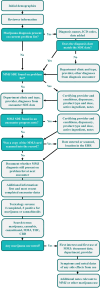Medical Marijuana Documentation Practices in Patient Electronic Health Records: Retrospective Observational Study Using Smart Data Elements and a Review of Medical Records
- PMID: 39715532
- PMCID: PMC11684775
- DOI: 10.2196/65957
Medical Marijuana Documentation Practices in Patient Electronic Health Records: Retrospective Observational Study Using Smart Data Elements and a Review of Medical Records
Abstract
Background: Medical marijuana (MMJ) is available in Pennsylvania, and participation in the state-regulated program requires patient registration and receiving certification by an approved physician. Currently, no integration of MMJ certification data with health records exists in Pennsylvania that would allow clinicians to rapidly identify patients using MMJ, as exists with other scheduled drugs. This absence of a formal data sharing structure necessitates tools aiding in consistent documentation practices to enable comprehensive patient care. Customized smart data elements (SDEs) were made available to clinicians at an integrated health system, Geisinger, following MMJ legalization in Pennsylvania.
Objective: The purpose of this project was to examine and contextualize the use of MMJ SDEs in the Geisinger population. We accomplished this goal by developing a systematic protocol for review of medical records and creating a tool that resulted in consistent human data extraction.
Methods: We developed a protocol for reviewing medical records for extracting MMJ-related information. The protocol was developed between August and December of 2022 and focused on a patient group that received one of several MMJ SDEs between January 25, 2019, and May 26, 2022. Characteristics were first identified on a pilot sample (n=5), which were then iteratively reviewed to optimize for consistency. Following the pilot, 2 reviewers were assigned 200 randomly selected patients' medical records, with a third reviewer examining a subsample (n=30) to determine reliability. We then summarized the clinician- and patient-level features from 156 medical records with a table-format SDE that best captured MMJ information.
Results: We found the review protocol for medical records was feasible for those with minimal medical background to complete, with high interrater reliability (κ=0.966; P<.001; odds ratio 0.97, 95% CI 0.954-0.978). MMJ certification was largely documented by nurses and medical assistants (n=138, 88.5%) and typically within primary care settings (n=107, 68.6%). The SDE has 6 preset field prompts with heterogeneous documentation completion rates, including certifying conditions (n=146, 93.6%), product (n=145, 92.9%), authorized dispensary (n=137, 87.8%), active ingredient (n=130, 83.3%), certifying provider (n=96, 61.5%), and dosage (n=48, 30.8%). We found preset fields were overall well-recorded (mean 76.6%, SD 23.7% across all fields). Primary diagnostic codes recorded at documentation encounters varied, with the most frequent being routine examinations and testing (n=34, 21.8%), musculoskeletal or nervous conditions, and signs and symptoms not classified elsewhere (n=21, 13.5%).
Conclusions: This method of reviewing medical records yields high-quality data extraction that can serve as a model for other health record inquiries. Our evaluation showed relatively high completeness of SDE fields, primarily by clinical staff responsible for rooming patients, with an overview of conditions under which MMJ is documented. Improving the adoption and fidelity of SDE data collection may present a valuable data source for future research on patient MMJ use, treatment efficacy, and outcomes.
Keywords: Epic; cannabis; cannabis use; chart review protocol; data collection; data sharing; dosage; drug use; electronic health records; human data extraction; learning health system; legalization; medical marijuana; patient care; physician; prescription drug monitoring program.
© Donielle Beiler, Aanya Chopra, Christina Gregor, Lorraine D Tusing, Apoorva M Pradhan, Katrina M Romagnoli, Chadd K Kraus, Brian J Piper, Eric A Wright, Vanessa Troiani. Originally published in JMIR Formative Research (https://formative.jmir.org).
Conflict of interest statement
Figures

References
-
- California Office of the Attorney General Medicinal cannabis guidelines. State of California, Department of Justice, Office of the Attorney General. 2022. [13-11-2024]. https://oag.ca.gov/medicinal-cannabis#:~:text=In%201996%2C%20California%... URL. Accessed.
-
- Medical marijuana: patient and caregiver resources. Commonwealth of Pennsylvania. 2019. [13-11-2024]. https://www.pa.gov/en/agencies/health/programs/medical-marijuana/medical... URL. Accessed.
-
- Pennsylvania medical marijuana program guide. Commonwealth of Pennsylvania. 2019. [13-11-2024]. https://www.pa.gov/en/agencies/health/programs/medical-marijuana.html URL. Accessed.
-
- 2016 Act 16. Pennsylvania General Assembly. 2016. [22-11-2024]. https://www.legis.state.pa.us/cfdocs/legis/li/uconsCheck.cfm?yr=2016&ses... URL. Accessed.
Publication types
MeSH terms
Substances
LinkOut - more resources
Full Text Sources
Medical

